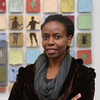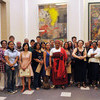UCT study empowers medical students through AI and open educational resources
20 February 2024 | Story Azraa Dawood. Photo iStock. Read time 3 min.
At the University of Cape Town (UCT), research conducted by the Digital Open Textbooks for Development (DOT4D) team in the Centre for Innovation in Learning and Teaching (CILT) has brought to light an innovative approach in medical education, leveraging artificial intelligence (AI) to empower students in creating open educational resources (OER).
A recently published study by Associate Professor Glenda Cox, Michelle Willmers, Robyn Brown and Professor Michael Held explores the utilisation of ChatGPT as a writing tool by undergraduate medical students engaged in the co-creation of chapters for an orthopaedics textbook, in collaboration with medical professionals. The paper highlights affordances provided to not only enhances students’ AI digital literacy skills, but also instil a sense of ownership and contribution towards their educational journey through acting as partners in the creation of OER.
Central to the study is a pedagogical philosophy that champions student autonomy and collaboration. “The lecturer’s approach was fundamentally about opening … the space for students to learn and grow,” Professor Cox explained. “This open, exploratory method proves that when students are given freedom, their capacity for innovation and creativity surpasses our expectations, enriching both their learning experience and the educational content they produce.”
The study highlights fascinating nuances of the lecturer’s process, particularly as it relates to assessment, quality and their ambitions to promote student voice through co-creation.
Empowering students as co-authors
The case study underscores the transformative impact of engaging students as partners in the creation of educational content and resources. “By involving students in the authorship of textbook chapters, we not only make academic material more relatable and accessible, we also empower students with a sense of contribution to the future learning,” Cox said. “The acknowledgment of students as authors and co-authors of knowledge not only motivates them to produce quality work; it also fosters a deeper connection with the material.”
“To fully harness the potential of AI in education, we need robust support systems, including critical AI digital literacy programmes for students and faculty alike.”
Acknowledging the study’s limitations, including its small sample size, Cox advocates for broader institutional support for AI technologies. “To fully harness the potential of AI in education, we need robust support systems, including critical AI digital literacy programmes for students and faculty alike.” The study also calls for global efforts to ensure AI-generated content is inclusive, aiming to mitigate biases and represent diverse perspectives, especially from the Global South.
Looking ahead
This research is only the tip of the iceberg in terms of innovative applications of AI in education, demonstrating the potential of technology to further enhance accessibility and learning outcomes. “Our work is just the beginning," Cox noted. “As we continue to explore the intersection of AI and education, the possibilities for transformative learning experiences are endless.”
As UCT leads the charge in educational innovation, this study contributes to the global conversation on the responsible use of AI in higher education, paving the way for a future where technology and collaboration play central roles in enriching teaching and learning practices.
 This work is licensed under a Creative Commons Attribution-NoDerivatives 4.0 International License.
This work is licensed under a Creative Commons Attribution-NoDerivatives 4.0 International License.
Please view the republishing articles page for more information.
Centre for Higher Education Development
In the news


.jpg)

































































































































































































































